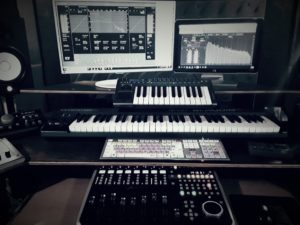Production

Tools Of The Trade
Traditionally, Rap/Hip Hop was made using turntables and samplers; some still is. But most modern production is done using a DAW (Digital Audio Workstation) such as ProTools, Logic, Ableton, Cubase, and Reaper. Computer based softsynths have taken over from hardware based synthesizers and drum machines.
FTC Production Examples:
Mixing

Audio mixing is the process of combining multiple individual tracks, such as vocals, instruments, and sound effects, into a stereo or multi-channel output that sounds balanced and cohesive. The goal of mixing is to achieve an optimal balance between the different elements of a recording, so that each part can be heard clearly and contributes to the overall sound.
In an audio mix, the engineer adjusts the volume levels, panning, and equalization of each track, as well as applying effects such as reverb, delay, and compression to enhance the sound. The mixing process involves careful attention to detail and a lot of listening, as the engineer adjusts each element of the mix to achieve the desired sound.
Audio mixing is typically done in a specialized digital audio workstation (DAW), such as Pro Tools, Logic Pro, or Ableton Live. In addition to basic volume and pan controls, these programs offer a wide range of tools and plugins for processing and manipulating audio, including EQ, compression, and time-based effects.
The ultimate goal of audio mixing is to create a final mix that sounds great across a variety of playback systems, from headphones to car stereos to high-end studio monitors. Once the mix is complete, it is typically sent to the mastering engineer for final processing and optimization before being released to the public.
Mastering
Audio mastering is the process of preparing and optimizing a final audio mix for distribution, typically in the form of a music album or a soundtrack for film, TV, or video games. Mastering involves applying a range of audio processing techniques, such as EQ (equalization), compression, limiting, stereo imaging, and volume normalization, to achieve a cohesive and balanced sound across all the tracks in the release.
The goal of mastering is to enhance the overall quality and clarity of the mix, making it sound more polished and professional. This involves ensuring that the levels of different instruments and vocals are balanced, and that the frequency range is optimized to sound good across a range of playback systems, from car stereos to headphones to high-end studio monitors. Mastering can also involve adding fades, crossfades, and other editing techniques to ensure that the album or soundtrack flows smoothly from one track to the next.
Audio mastering is typically performed by a specialist audio engineer who has expertise in using specialized mastering software and equipment. The mastering process is typically the final step in the music production process before the music is released to the public.
